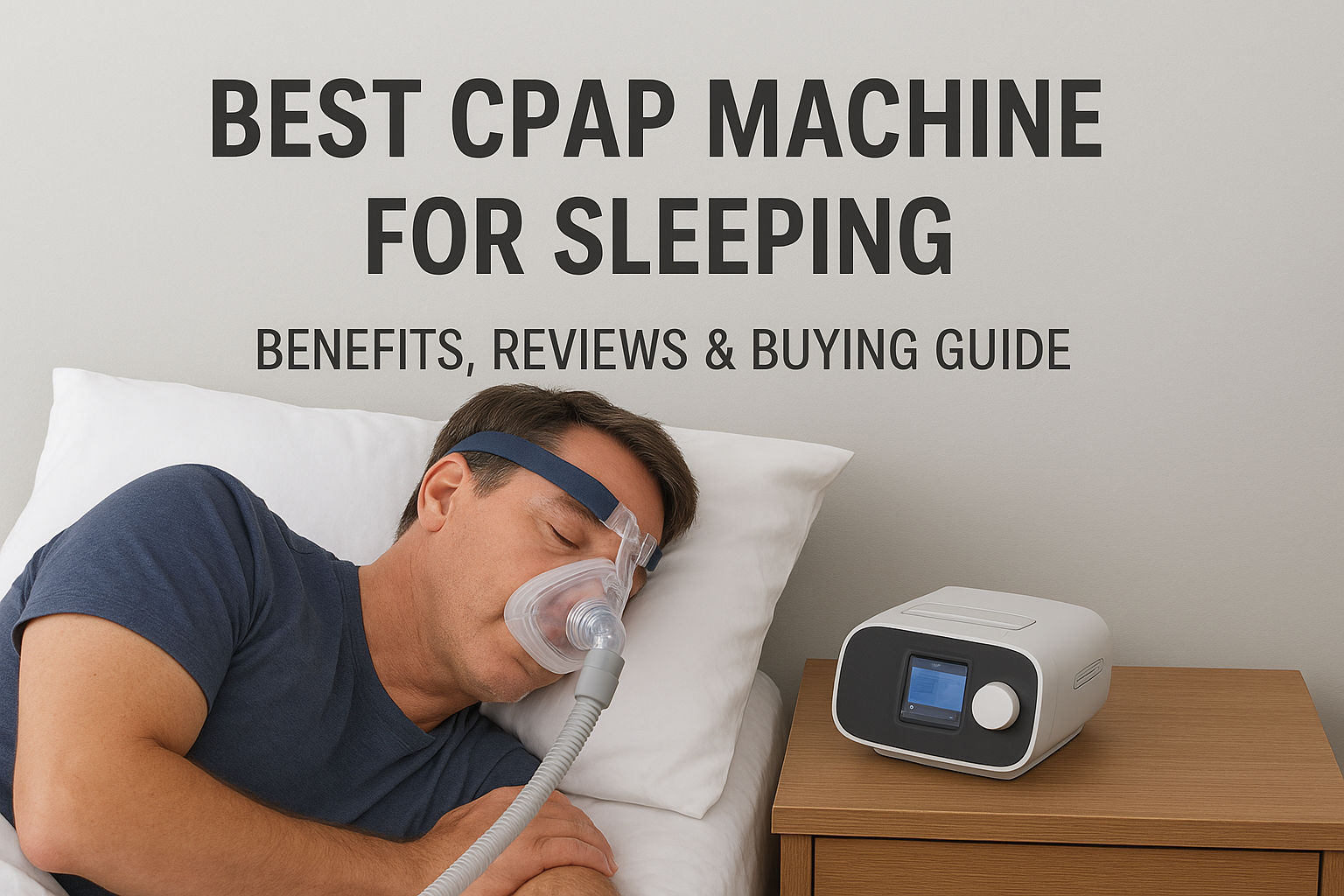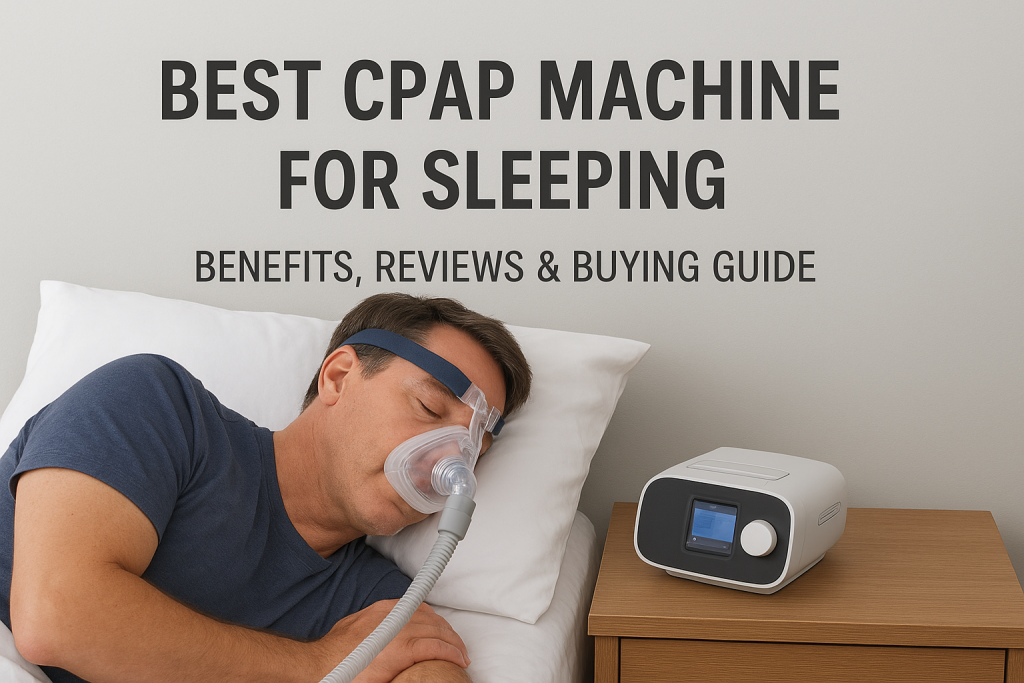Best CPAP Machine for Sleeping: Benefits, Reviews & Buying Guide


Introduction to CPAP Machines for Sleeping
Struggling with restless nights, loud snoring, or waking up gasping for air? You might be one of the millions dealing with sleep apnea. A proven solution for this condition is the CPAP machine for sleeping—a device designed to keep your airways open and help you breathe smoothly through the night.
In recent years, CPAP machines have become a game-changer for people with obstructive sleep apnea (OSA). They not only improve sleep quality but also reduce serious health risks like high blood pressure, heart disease, and daytime fatigue.
In this comprehensive guide, we’ll explore everything you need to know about CPAP machines—from how they work, their benefits, different types available, and expert recommendations for 2025—to help you make the right choice.
What is a CPAP Machine?
A CPAP (Continuous Positive Airway Pressure) machine is a medical device that delivers a steady stream of air pressure through a mask. This air pressure prevents your throat muscles from collapsing during sleep, keeping your airway open.
Think of it as a gentle “air splint” that ensures you breathe normally throughout the night.
Why CPAP Machines Are Essential for Sleep Apnea Patients
Sleep apnea occurs when your breathing repeatedly stops and starts while you sleep. This can cause loud snoring, interrupted rest, and dangerous drops in oxygen levels.
Without treatment, sleep apnea can lead to:
- Hypertension (high blood pressure)
- Stroke and heart disease
- Excessive daytime sleepiness
- Poor concentration and memory problems
A CPAP machine for sleeping is the gold-standard treatment because it addresses the root cause of sleep apnea: blocked airways.
How CPAP Machines Improve Sleep Quality
The Science Behind CPAP Therapy
When you sleep, the muscles in your throat relax. For sleep apnea patients, these muscles collapse, obstructing airflow. A CPAP machine gently pushes air into your airways, preventing blockage and ensuring continuous breathing.
Benefits of Using a CPAP Machine for Sleeping
- Restores normal breathing
- Reduces or eliminates snoring
- Improves deep sleep stages
- Increases daytime alertness
- Lowers health risks associated with sleep apnea
Common Myths and Misconceptions
- Myth: CPAP machines are loud.
Truth: Modern CPAP devices are whisper-quiet. - Myth: CPAP therapy is uncomfortable.
Truth: With the right mask and adjustments, most users adapt within weeks. - Myth: CPAP cures sleep apnea.
Truth: It’s a treatment, not a cure, but it effectively manages the condition.
Great 👍 Let’s continue from where we left off and complete the full long-form guide on CPAP machine for sleeping.
Types of CPAP Machines Available
Not all CPAP machines are the same. Depending on your diagnosis, comfort needs, and budget, you may be recommended one of the following:
Standard CPAP Machines
These deliver a fixed air pressure throughout the night. Once your doctor prescribes the correct pressure level, the machine maintains it consistently.
👉 Best for: People with mild to moderate sleep apnea who don’t need variable pressure.
BiPAP Machines
BiPAP (Bi-level Positive Airway Pressure) machines provide two pressure settings: a higher one when you inhale and a lower one when you exhale.
👉 Best for: Patients with severe sleep apnea or those who find it hard to exhale against constant pressure.
Auto-CPAP (APAP) Machines
APAP machines automatically adjust pressure levels throughout the night based on your breathing patterns. They are more advanced and offer personalized therapy.
👉 Best for: People who need flexibility, frequent travelers, or those with changing sleep positions.
Choosing the Best CPAP Machine for Sleeping
When shopping for a CPAP machine, several features determine your comfort and effectiveness.
Key Features to Look For
- Adjustable pressure settings
- Built-in humidifier (prevents dry mouth and nasal irritation)
- Ramp feature (gradually increases air pressure as you fall asleep)
- Data tracking (for sleep reports and medical monitoring)
CPAP Masks: Types and Comfort Levels
The mask is as important as the machine itself. Common types include:
- Nasal Masks – Fit over your nose, lightweight, and ideal for side sleepers.
- Nasal Pillow Masks – Minimal design, rest at the nostrils, great for people who feel claustrophobic.
- Full-Face Masks – Cover nose and mouth, recommended for mouth breathers.
Noise Levels and Portability
Modern CPAP devices are ultra-quiet (around 25–30 decibels) and some even come with travel-friendly designs. Portable CPAP machines are great for frequent flyers and campers.
CPAP Machine Side Effects and How to Minimize Them
While CPAP therapy is highly effective, some users experience minor side effects.
Common Discomfort Issues
- Dry nose or throat
- Skin irritation from the mask
- Claustrophobic feeling
- Air leakage
How to Get Used to Sleeping with CPAP
- Start by wearing the mask while awake to get comfortable.
- Use the ramp feature to gradually build up air pressure.
- Try different mask sizes until you find the perfect fit.
Tips for Comfortable Night Sleep
- Keep your CPAP machine clean to avoid infections.
- Use a heated humidifier to reduce dryness.
- Position your tubing to prevent tangling during sleep.
Maintenance and Care for Your CPAP Machine
A well-maintained machine ensures long-lasting performance and healthy breathing.
Cleaning and Hygiene Best Practices
- Wash mask and tubing daily with mild soap.
- Use CPAP cleaning wipes for quick maintenance.
- Disinfect weekly with CPAP cleaning systems.
Filter Replacement and Machine Longevity
- Replace disposable filters every 2–4 weeks.
- Wash reusable filters weekly.
- Average machine lifespan: 5–7 years.
Travel and Storage Tips
- Always carry CPAP machines in a travel case.
- Bring an international power adapter for trips abroad.
- Store in a cool, dry place away from direct sunlight.
Insurance, Costs, and Accessibility
How Much Does a CPAP Machine Cost?
- Standard CPAP: $500–$800
- Auto-CPAP: $800–$1,200
- BiPAP: $1,200–$3,000
Insurance Coverage and Medicare
Most insurance providers cover CPAP machines if prescribed. Medicare often covers up to 80% of the cost after meeting deductibles.
Renting vs. Buying a CPAP Machine
- Renting: Lower upfront cost, great for short-term use.
- Buying: More cost-effective for long-term therapy.
Real User Experiences with CPAP Machines
Success Stories from Sleep Apnea Patients
Many users report life-changing improvements such as reduced snoring, higher energy, and better mood after consistent CPAP use.
Common Struggles and How They Overcame Them
Some initially find the mask uncomfortable or noisy. With persistence, proper adjustments, and guidance from sleep specialists, most users adapt within weeks.
FAQs About CPAP Machines for Sleeping
Q1. Is CPAP therapy safe for long-term use?
Yes, CPAP therapy is considered safe and effective for long-term use with minimal side effects.
Q2. Can CPAP cure sleep apnea permanently?
No, CPAP does not cure sleep apnea—it manages the condition by keeping airways open during sleep.
Q3. What’s the best CPAP machine for beginners?
ResMed AirSense 11 is often recommended for first-time users due to its comfort and easy-to-use features.
Q4. How many hours should you use a CPAP machine per night?
Ideally, you should use it for the entire duration of your sleep—at least 6–8 hours.
Q5. Are there alternatives to CPAP machines?
Yes, alternatives include oral appliances, positional therapy, and in severe cases, surgery. However, CPAP remains the most effective option.
Q6. How do I know if my CPAP machine is working properly?
Most modern machines provide usage reports. If you feel more rested and snoring reduces, it’s likely working well.
Conclusion: Is a CPAP Machine Right for Your Sleep Health?
If you suffer from sleep apnea or restless nights, a CPAP machine for sleeping could be the life-changing solution you need. With proper use, it improves sleep quality, prevents health complications, and boosts overall well-being.
Whether you’re looking for a budget-friendly model or a high-tech smart CPAP, the right choice depends on your medical needs, comfort preferences, and lifestyle.
Remember: consistent use, proper maintenance, and the right mask are key to success. Consult your doctor to find the best machine for your needs—and reclaim restful nights.
🔗 Recommended Resource: American Sleep Apnea Association – Learn more about CPAP therapy and sleep apnea treatment.
















